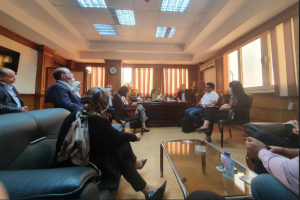Flicking through brochure pages which brandish the appeal of holiday resorts could be the most leisurely way for many to pick and plan their time away.
But Muslims in Egypt are now being encouraged to consider something more weighty on the sidelines – how to take a vacation which follows the rules and laws of Islam.
 A new Cairo-based travel operator, “Shouq Travel,” is hoping to tap into the global Muslim tourism boom with a new initiative encouraging Muslims to arrange their vacations in accordance to Sharia (Islamic) law.
A new Cairo-based travel operator, “Shouq Travel,” is hoping to tap into the global Muslim tourism boom with a new initiative encouraging Muslims to arrange their vacations in accordance to Sharia (Islamic) law.
The operator, a first of its kind in Egypt, was initiated by a team of Egyptian businessmen, who seek to provide Sharia tourism by organizing holidays for customers who must stay in special hotels and visit specific tourist sites.
A statement on the operator’s website said “Family Tourism” is accommodated through the practices of “Halal tourism,” which includes: “Organizing family trips that agrees with our traditions, our Egyptian culture and our el-Sharia teachings. We are dealing with a large number of hotels that provide Halal meat … and do not present alcoholic beverages on board, or pork.”
The site also said that the operator provides other alternatives for Muslim women, who wear full Islamic clothing, such as “covered swimming pools or other places reserved only for women.”
Female visitors to the sites are required to wear modest clothes and may only be accompanied by a first-degree relative.
Shouq Travel organizes trips across Egypt as well as Hajj pilgrimage tours in Saudi Arabia, with the added feature of cultural and religious seminars for adults.
Egypt, a country which has witnessed Islamists gain political momentum since the overthrow of the former regime in the 2011 mass uprising, has seen an influx of Islam-inspired projects.
A niqab-only TV channel in Egypt recently launched on the first day of the month of Ramadan earlier in July, employs only women in niqab, even for behind-the-camera jobs.
But the tourism industry has boomed for Muslim travel worldwide.
From halal spas to prayer rooms at airport terminals, the global tourism industry is gearing up for a projected boom in Muslim travel over the next decade, experts say.
Spending by Muslim tourists is growing faster than the global rate and is forecast to reach $192 billion a year by 2020, up from $126 billion in 2011, according to a study conducted in 47 countries by Singapore-based halal travel specialist Crescentrating, along with DinarStandard, a U.S.-based firm that tracks the Muslim lifestyle market.



